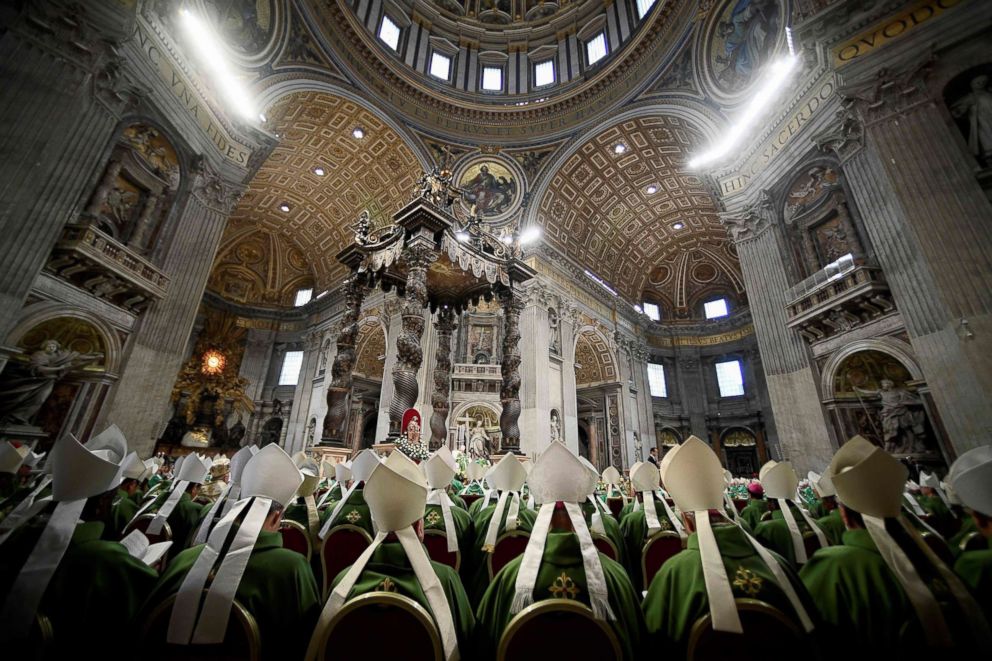 Filippo Monteforte/AFP/Getty Images
Filippo Monteforte/AFP/Getty ImagesAs I have written before, Pope Francis has returned us to 1970's Catholic confusion and chaos. What is different this time are the new media platforms and instant communication and the ability of polarized factions to network and lobby.
What Pope Francis has done is to show almost two generations of Catholics who don't really remember the confusion and chaos of the 1970's what progressive Catholicism does to the Church.
What is unique this time is that the institution of the papacy is being weakened by this liberal, progressive conversion. Thus what was once the source of unity for the Church after the Council of Trent and up until the Second Vatican, an extremely orthodox regal papacy teaching very clearly the Deposit of Faith and upholding rigid Catholic discipline in an authoritative way, is collasping under Pope Francis as he converts the papacy to the Archbishop of Canterbury model and the Church to a loose confederation of churches with widely diverse beliefs and morals, regionally based.
Out of all this arises a great reformer somewhat similar to Martin Luther, who the pope of Martin Luther called the Great Accuser, which the current pope refers to this new Great Reformer by the same name used for Martin Luther!
This new Martin Luther is Archbishop Vigano! That is what an ABC commentary calls him.
Are we at a new Reformation and will the new protesting Church be called the Viganoran Church?
Press title for complete ABC commentary:
The Catholic Church reaches a turning point: ANALYSIS
NEW YORK (NY)
ABC News
October 28, 2018
By David Wright
Even for an institution that measures its milestones by the millennium, the Roman Catholic Church is now wrestling with an urgent, some would say epochal, moment of truth.
It’s an existential crisis brought on by two threats from within: the worldwide sexual abuse scandal and deep internal divisions over the core message of the faith. The last time the Vatican faced a crisis this big, according to some respected church scholars, was 500 years ago during the Protestant Reformation.
The battle lines in the church mirror the divisions of Trump’s America. The partisan infighting, just as bitter. And what makes it more than just the standard squabbling among the curia is the larger sexual abuse scandal looming in the background. This is what reformation looks like in the #MeToo era.
The Martin Luther of the new rebellion is the archbishop who dared to call on the pope to resign for turning a blind eye to the sexual misconduct of an American cardinal. Archbishop Carlo Vigano, former papal nuncio to the U.S., has faced serious pushback from the pope’s defenders for calling out Francis over his handling of disgraced former Cardinal Theodore McCarrick. Vigano is in hiding, saying he fears for his life. But he’s not backing down.
Vigano’s new letter denounces what he calls the "scourge of homosexuality" in the clergy which he now flat-out claims is to blame for the broader sexual abuse scandal rocking the church Vigano urges his fellow bishops to back him up.
4 comments:
Vigano is not a Luther. He is more along the lines of St Catherine of Siena who was instrumental in healing the Great Western Schisms of the 15th century. The Church has been in internal schism since the Council, when the Modernists hijacked it and applied their power to legitimise their own interpretation of its documents. The internal schism has grown under this papacy to be on the verge of a full fledged one.
The popes from Pius IX to Pius XII were men of exceptional holiness and not inconsiderable ability. Leo XIII (1878-1903) was probably the greatest teaching pope of modern times and was a first-rate classical scholar. They were conscious of their exalted position, but equally conscious of the limits to their authority.
However, the loss of the papal states and the popes' temporal authority led to an increased focus on their spiritual authority, and an unhealthy ultramontanism which would cast them as 'oracles of God'. Pius X (1903-1914) was not as 'princely' as his predecessor, but he had an over-exalted view of the papacy, which Mark Thomas has usefully quoted for us on more than one occasion.
It is not in Pope Francis's nature to delegate authority. If his supporters are to be believed, he has an agenda which would involve a 'paradigm shift' and is running out of time in which to implement it. Whereas Paul VI's subtle turn of mind led him to compare himself to Hamlet, and whose papacy was one of contradictions, Francis lacks intellectual subtlety but is not short on animal cunning. Expect much talk of 'synodality' but recognize it for what it is - a smokescreen.
Yes, next question.
The thrust of V-2 Council was an attitude of openness to the world. A friendliness to purchase "credibility" from a secular world already in enmity to God.
Luther's initial purpose was to reform the bad behavior of the hierarchy, and for that there was plenty of support within the Church at the time already.Pope Francis does not want to reform the Church. If he did he would be on the McCarrick case like duck on a June bug. He wants to change the Church not to please God but to please men, particularly the sexually disoriented segment, and for that he is willing to discard or buy into anything that he thinks will get him to his objective. He is an apostate. Vigano and those opposing the his radical agenda are the Catholics. Our Holy Father should keep in mind St. James's admonition:
"Do you not know that friendship with the world is enmity with God? Therefore whoever wishes to be the friend of the world makes himself the enemy of God." The Letter of James 4:4
Anon-1
Post a Comment